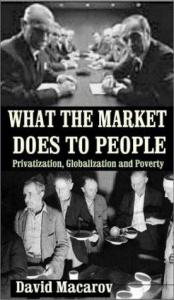What the Market Does to People
Blurb
This book is a description, explanation and expose of the poverty that currently afflicts large swathes of people in both developed and less-developed nations. It examines and illustrates the shocking extent, the kinds and the results of poverty from both societal and individual perspectives. The origins of poverty in attitudes and ideologies, and the societal norms and structures that currently keep billions of people poor, are examined.Methods of determining statistical poverty lines, and their uses in hiding the extent of real poverty, are explained, as well as some little-known aspects of the poverty lines used in various countries. The subterfuges used by most governments in counting the poor are also examined.
Particular attention is paid to the most recent and widespread causes of poverty, namely, privatization and globalization, with their emphasis on the need for a market-driven economy, in which greed is posited as goal, guide and god. The market-driven society that they serve to strengthen is discussed in terms of its effect on medical services, education and social welfare, usually resulting in two-tiered systems, one for the rich and the other for the poor. The social results of privatization and globalization – including lack of accountability, wage depression, corruption, and the growth of inequality – are also outlined.
Efforts to reduce or eliminate poverty are illustrated, ranging from international activities to local programs, including efforts to achieve full employment, better and wider education, social welfare reform, microenterprises and a guaranteed minimum income, none of which seem to work to any significant degree, since inequality within nations and between nations is demonstratedly growing.
The possibility of widespread changes leading to a drastic reduction in worldwide poverty is examined, including charismatic leaders, unforeseen crises, rising popular discontent, a civil society, and world government. Using various accepted methods of prediction, the future of poverty is postulated.

 English
English Español
Español Deutsch
Deutsch










Member Reviews Write your own review
Be the first person to review
Log in to comment